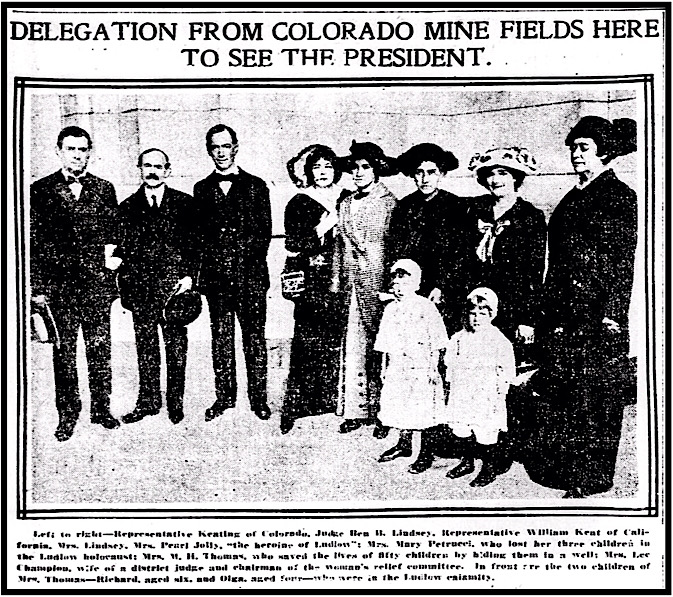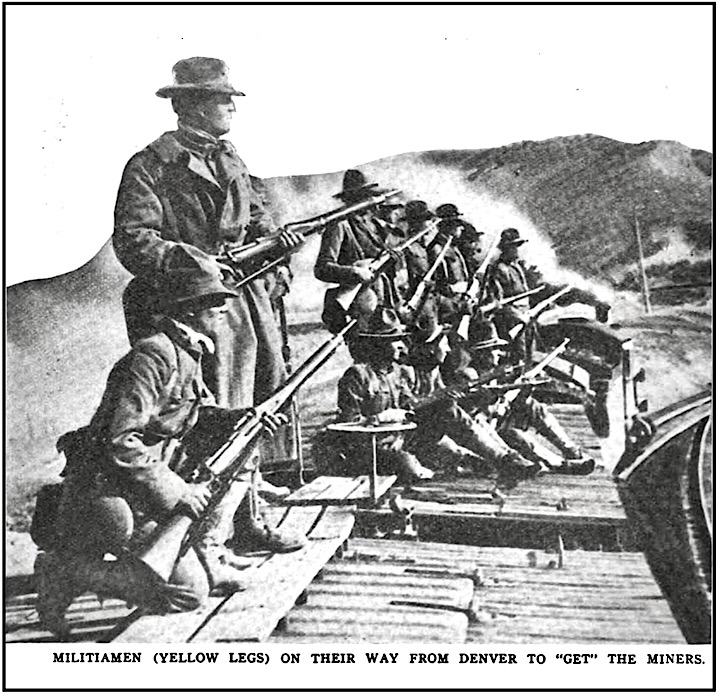 —————
—————
Hellraisers Journal – Monday June 8, 1914
New York City – Judge Lindsey Continues Before Commission on Industrial Relations
From the Washington Evening Star of May 21, 1914:

Pearl Jolly, Mary Petrucci, Mary Thomas,
Mrs. Lee Champion, Rachel and Olga Thomas
—————
New York, New York, May 28, 1914
Judge Lindsey testified before the Commission on Industrial Relations during the afternoon session of May 28th. Present were Chairman Walsh, and Commissioners Ballard, O’Connell, Lennon, Garretson, and Harriman.
[Judge Lindsey continues:] It is well for the people of this country to know the violence of capital, the violence of corporations, that is silent, if you please, and not noisy like the violence they promote. I think, therefore, that they owe it to our people to consent to the appointment by the President of a board of arbitration, who will go out there and investigate those conditions and listen to both sides, and both sides being willing, assuming, of course, the board is fair and just and acceptable to both sides, to abide by the decision they may come to. And I think a great mistake is being made by the powers that control the industrial government of this country, the seat of which is here in New York, and is as superior to the President of the United States, unless he is willing to exert himself in spite of it, as the boss over the employee in a factory. That is my view of it.
And being in that position, knowing that they have said, or claimed, to have the Constitution back of them, certain laws back of them that were primarily designed for property, they owe it to our people to concede, to give, if you please, some of this terrific power by consenting to this board, and letting them, so far as it is possible, at least, for temporary purposes, to adjust the difficulties up there and to relieve our people of the passion into which they have been plunged, but the fact that when these Federal troops were withdrawn, if they are, because of this condition that has grown up for years and years, beginning with the corporations themselves, their own lawlessness, will be too much, and there is a possibility of the repetition of Ludlow unless the President will keep the Federal troops there, and to bring about any sort of settlement, go a step further and appoint this industrial commission, and if both sides do not consent to this arbitration, then it is our contention, in the interests of peace, because of the military necessities of the case, because a republican form of government, with the confession of the governor of the State, has broken down in Colorado and the Constitution says the Federal Government shall guarantee us a republican form of government, that he would be justified in taking some means, even though they be forcible, to compel those who refuse to arbitrate to consent to arbitration.
Now, that is the feeling of many of our people and I speak that feeling. I am not here to speak on behalf of the militia, I am not here to speak on behalf of the mine owners. I am not here to-day to speak on behalf of the mine workers. I am simply here to voice my feelings, after years of experience, being down in the midst, knowing both sides, understanding their viewpoint, to make clear to you, as an industrial commission, in a general way, some of the conditions that have existed in our State and that exist in other States, that have brought about these results, in order that, in time if not now, there may be one result—an investigation like this, and that will begin to tackle conditions and tackle causes that make for these effects, and I would feel false in my duty to the children of my State and the children of this country if I did not take a bigger opportunity for this problem than merely sitting behind a desk and trying the immediate troubles of children. I have done that for 14 years, and I have looked into the faces of these children, and I have tried to think and find out why do boys do bad things? Why do girls do bad things? And I think I have found out. And I look at it and then I ask myself, why do men do bad things? And the reason in the one case is largely the reason in the other; it is the condition, in a large measure, not altogether, say, the environment, their viewpoint.
My plea is for a better understanding of these questions. Therefore I thought if I came over to New York after the President of the United States had given us a most courteous hearing, that Mr. Rockefeller himself would be willing to see me and permit me to present this phase of the situation. But after a courteous request for that privilege he has refused, not only to see me, but while I am of no particular consequence perhaps, I think it is of great consequence that he should have heard the miners’ wives whom you courteously and kindly and considerately heard here yesterday, whom the President of United States heard, because, I contend that when men receive profits or have possessions that promise profits, they haven’t any right to take the impersonal view that he takes, and deny any responsibility. Kings have gone down among their people, even in the days of the old feudalists, or even in modern conditions, we have known of kings going among their people and lending them succor and help and not being so impersonal and above them that they would not listen to their woes and troubles and miseries, and be willing to lend something of themselves to really find the cause of these things, and help to solve them, and surely Mr. Rockefeller is no bigger than the President of the United States. He isn’t any bigger than kings, who have done it.

 —————
—————
